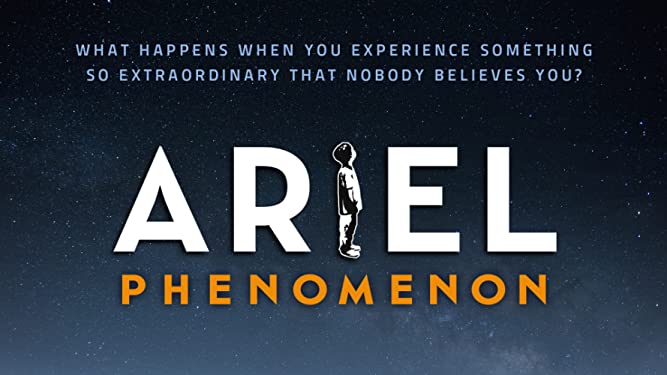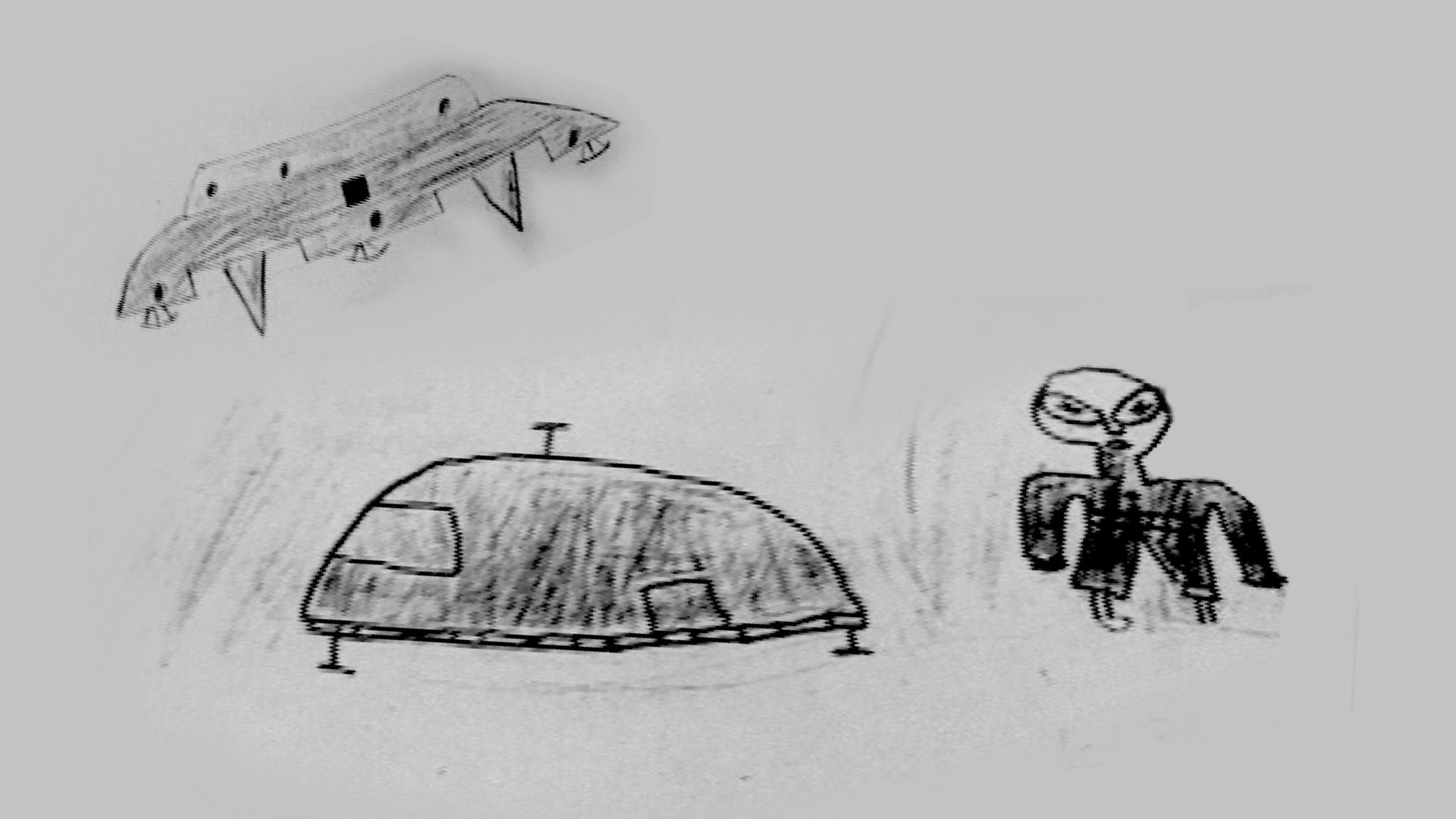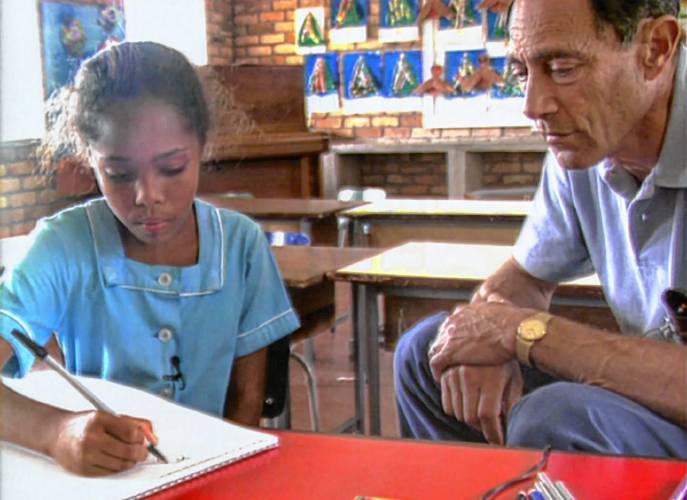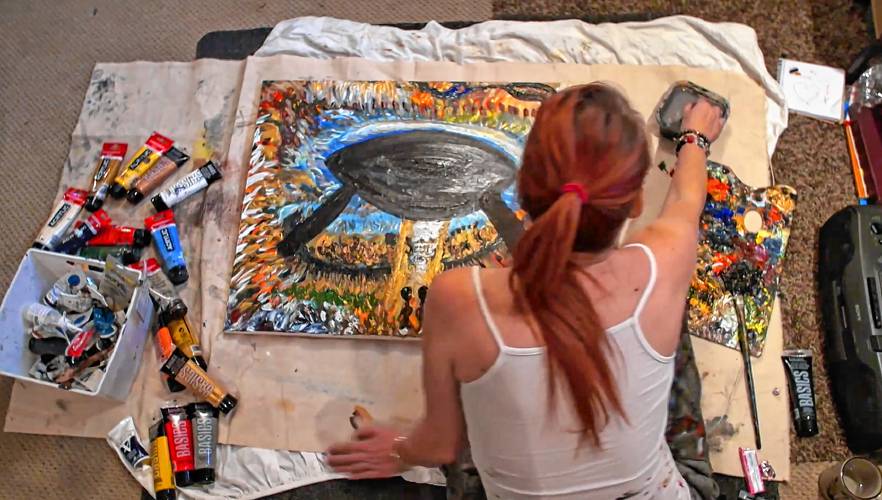
Ariel Phenomenon tells the story of how one U.F.O changed the lives of a whole generation of kids at the Ariel School in Zimbabwe. On September 16, 1994, around 62 children ages six to twelve claimed to witness a silver, oval-shaped craft land near the school and saw a creature, black in appearance come out and approach them. They were later drawn by the children and look like the stereotypical alien drawings we see in culture.

The films take two parts, one where the filmmakers assembled the footage and research a BBC reporter and Harvard professor did on the incident and the other follows the experience of one of the children coming back to the school as an adult to confront what she witnessed that day. The Ariel school resides near the town of Ruwa, a rural community around 22 km southeast of the capital, Harare. The Ariel school itself was an expensive private school at the time where most of the pupils were from wealthy white families who came from Harare. One of those pupils was Emily Trill, a woman whose family were missionaries in Africa when she attended the school. The film follows her journey to revisit Ariel from Toronto following breaking off her engagement with her fianc? of six years. ?She briefly alludes to the audience and filmmakers that her trauma from that incident has resided with her (even in her long-term romantic relationship) and that prompts her to try and confront it. It becomes clear in the beginning that it?s been a source of constant strife for Emily as we see all the painting and art, she?s made depicting what she saw that day.
What she witnessed had been debated for a long time prior to the making of this documentary. The film presents the children?s accounts of the incident through the interviews first done by the BBC journalist Tim Leach a few days after the incident. The editing helps us to connect the same dots that the reporter and Harvard Professor John Mack make as they conclude that the kids are telling the truth. Of course, being highly revered in academia and journalism while claiming to believe in aliens isn?t exactly standard and the two were ostracized from their fields, being labeled as lunatics. One could conclude the same happened in Emily?s relationship as her future groom refused to believe she witnessed this, and it caused a rift in their trust between each other.
What the film deals with here is inherently psychological, making it very hard to depict effectively. It?s clearly an extraordinary story and it makes sense why the filmmakers would spend countless hours over several years to make a film of this. They clearly went to great lengths to assemble drawings from the children, gather archival footage from old news reports and tv appearances all while making it into a coherent story. That?s not an easy feat considering there?s not much to go on as far the actual incident. It was only witnessed by the children and the school itself had many of its pupils scattered due to the political upheaval in Zimbabwe making it hard to interview them at present. They got lucky with Emily?s story as it provided them with a firsthand experience to follow with Emily?s return to the school, and we get to witness that journey. It?s a journey that deals so much with the psychological and the film never takes many artistic measures or has the moments to communicate that psychological impact Emily is experiencing. Emily herself is very stilted during most of the trip and her touring the school while speaking to the camera itself is not the most emotionally gripping filmmaking. Her onscreen personality is very reserved (and that?s understandable, considering what?s she?s been through), but it doesn?t make for the most entertaining and insightful filmmaking.

The same goes for the interviews done by reporter Tim Leach and John Mack only seen in archival footage. ?Both are unable to be presented in a manner which allows the audience to fully connect and feel their stories. All three main subjects Tim, John and Emily experience this in very isolating manners as they are mostly interviewed by themselves and are never portrayed as having any insightful conversations or dialogue with anyone. This is what I think the film lacks. It needed a dialogue about what happened to keep the psychological impact present in the drama of what happened and what?s happening on Emily?s return. The film is more interesting when Emily is reuniting with the teachers, she had at the time but the problem there is that they didn?t witness what she did. Her brother did and apparently was very affected by it, but they barely investigate that. In the end, this needed vulnerable relational moments and none of the subjects of the documentary are willing or able to reveal that.
Personally, I was more curious to hear more about what the filmmakers thought the story had to say about how the aliens apparently communicated to many of the children that the earth needed to be taken care of. It seems that idea was never taken seriously and was only used by skeptics to point out that it was a likely political stunt by the children and or John Mack himself. The film also barely touches on how this incident could be seen as a spiritual experience that the children had was from a creator who wanted people to take better care of the earth. Maybe the film should have stood up and said they believed this was an incident that should have awoken the world to the dangers of pollution. A warning that ended up being dismissed as mass hysteria or was never heard about from most people. The film only briefly touches on the idea that the incident could have been a spiritual experience and barely goes in depth to what this spiritual experience would mean nor what this event would mean for the scientific community.

The film seems more occupied with letting us decide if we believe the children or not, an interesting idea to be sure. It?s fascinating to think about how in this era of false information, fake news, and mass hysteria people barely attached themselves to a U.F.O landing that was backed by a Harvard Professor and respected Western journalist. People in the West often will believe the radical ideas surrounding political subjects in their home country but this idea of belief is not really connected to anything that?s happening today. This incident has a much more existentialist nature. It should be less about if we believe the children and more about what do we say about this incident, if we do believe the children. Many of the parents and teachers state they believe the children as do the reporter and professor, but what does that mean for humanity? The film confronts how much people don?t want to believe or think about what would happen if it was proved they weren?t in charge of their lives and not the superior being in the known universe. So, this story deals with a philosophical and psychological matter and that?s hard to portray through individual people?s stories but it?s what the film relies on to grip the audience and unfortunately that holds it back from being a great film.
Ariel Phenomenon is available on VOD on Decemeber 25th, 2022.




